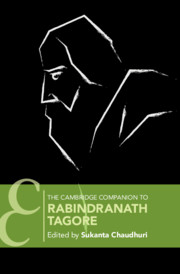Book contents
- Frontmatter
- Contents
- List of Illustrations
- Notes on Contributors
- Preface
- Note on Conventions and Practices
- 1 Rabindranath Tagore: From Art to Life
- 2 A Garland of Many Tagores
- Part I Overviews
- 3 Rabindranath and His Times
- 4 Tagore's Poetry: An Overview
- 5 ‘Something of a Musician’: Tagore's Songs
- 6 Rabindranath Tagore: Drama and Performance
- 7 Imagined Worlds: The Prose Fiction of Rabindranath Tagore
- 8 The English Writings: An Overview
- 9 Tagore and Indian Literature: Influence and Presence
- 10 Rabindranath Tagore and Literary Communication across Borders
- 11 Tagore and the Visual Arts
- Part II Studies
- List of Tagore's Works Cited, with Index
- Further Reading
- General Index
5 - ‘Something of a Musician’: Tagore's Songs
from Part I - Overviews
Published online by Cambridge University Press: 24 December 2019
- Frontmatter
- Contents
- List of Illustrations
- Notes on Contributors
- Preface
- Note on Conventions and Practices
- 1 Rabindranath Tagore: From Art to Life
- 2 A Garland of Many Tagores
- Part I Overviews
- 3 Rabindranath and His Times
- 4 Tagore's Poetry: An Overview
- 5 ‘Something of a Musician’: Tagore's Songs
- 6 Rabindranath Tagore: Drama and Performance
- 7 Imagined Worlds: The Prose Fiction of Rabindranath Tagore
- 8 The English Writings: An Overview
- 9 Tagore and Indian Literature: Influence and Presence
- 10 Rabindranath Tagore and Literary Communication across Borders
- 11 Tagore and the Visual Arts
- Part II Studies
- List of Tagore's Works Cited, with Index
- Further Reading
- General Index
Summary
I claim to be something of a musician myself. I have composed many songs which have defied the canons of orthodox propriety and good people are disgusted at the impudence of a man who is audacious only because he is untrained. But I persist, and God forgives me because I do not know what I do. Possibly that is the best way of doing things in the sphere of art. For I find that people blame, but also sing my songs, even if not always correctly.
A UNIQUE GENRE
Rabindrasangit is unique as a musical genre in three respects. First, here high poetry blends seamlessly into high music, producing a new synthesis, a third entity. It is this x-factor, going beyond a mere match of lyric and tune, that differentiates Rabindrasangit from any other musical genre. Several notable contemporaries of Tagore like Dwijendralāl Rāy, Atulprasād Sen, Rajanikānta Sen, and Kāzi Nazrul Islām have achieved an impressive combination of beautiful words and appropriate notes, each in his own way. But only in Rabindrasangit do we find this special communion of poetry and music, each influencing the other and losing its exclusive identity in the process.
Second, in purely musical terms, disparate elements mingle imperceptibly to form a new integral whole. The dramatist Dwijendralal Ray, who was well versed in Hindustāni classical music, wrote perceptively to Tagore on 25 March 1896, before an unfortunate rift in their relationship:
Must I be totally unable to grasp the tunes of your songs? You produce a pleasant, varied combination of rāgas and rāginis, but it is difficult to learn…. I have successfully mastered the rā ginis of perhaps only two of your excellent songs…. What you do is to grind the rāgas and rāginis into a paste of spices, and use it to cook your lyrics.
This is why highly trained classical singers often find it difficult to render Tagore's apparently simple songs: the ‘spices’ cause the main melody to deviate arbitrarily from the standard structure of a rāga. Some even try to ‘correct’ the ‘untrained’ Tagore, thereby robbing Rabindrasangit of its essence. Needless to say, Tagore has been widely charged with impairing the rigour and purity of the structures of classical music.
- Type
- Chapter
- Information
- The Cambridge Companion to Rabindranath Tagore , pp. 85 - 101Publisher: Cambridge University PressPrint publication year: 2020



